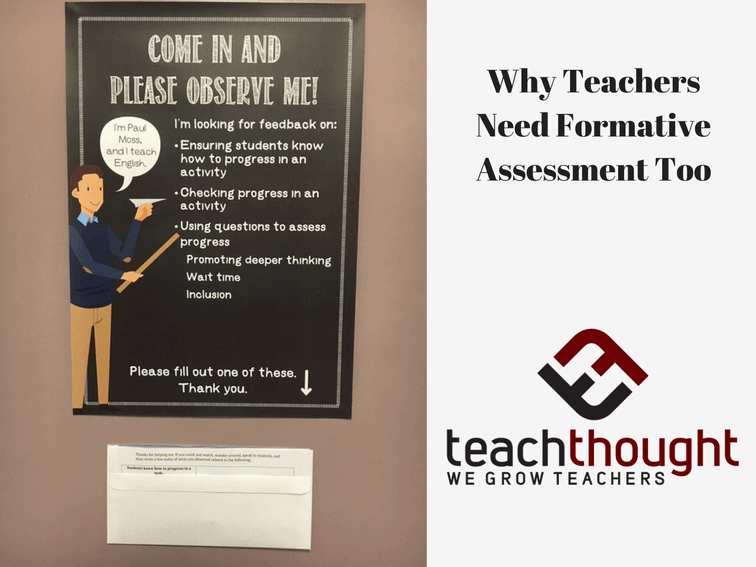
How Teachers Observing Other Teachers Can Help Everyone
by TeachThought Staff
When you saw the image above, it may have surprised you in some way.
If you’re a teacher, you may have instantly wondered if you would, should, or could do it, and I bet if you’re an administrator you probably wished your staff already did.
Reactions I’ve had from it so far include ‘how brave’ to ‘how crazy’ to ‘that’s inspired’ to ‘what a brown nose’. But the hyperbolic reactions don’t surprise me, because being observed, no matter what anyone says or desires to be true, still remains a teacher’s most hated part of teaching, and having someone actively seek it out is …..well, just hyperbolically irregular.
For a long time, I preferred to be left alone in my classroom. Here’s why:
- I was confident I was doing a good job.
- I was confident that I could self-identify issues if or when they arose.
- Having someone in the room made me a little nervous, and I felt slightly unnatural as I went about my craft.
- I thought what I was doing in the room could be judged out of context.
But in reality, I was depriving myself of an enormous opportunity to become a better teacher, because having others observe my teaching is now giving me a springboard from which to grow very quickly. As you can see in the poster I stick up on my classroom door (but not for every lesson by the way), I am asking for feedback on areas that I believe are key to an effective lesson.
The necessary growth of eLearning, remote teaching, and the related digital and blended learning tools only makes this kind of reflection and teacher observation easier–and more useful for teachers who need support.
They can increase teacher reflection
Having more frequent insights into that process acts like formative assessment strategies for me. I am forever banging on about the importance of formative assessment for my students, and its ability to provide better snapshots of skills acquired, so subjecting myself to the same process only seems logical. In fact, it would not only be ironic to my students to observe me shying away from such a process but hypocritical.
They can help identify your blind spots
I realize now that I actually have nothing to lose in the process of observation. If I am doing a good job, then the feedback will indicate so. If I am not doing a good job, the feedback means I can adjust accordingly, and do it quickly and now, rather than being told in a major observation. Yes, it’s painful to hear criticism of your own teaching, but I’ll take that pain over the pain of being told in a formal observation any day.
They can increase alignment and precision
In terms of the last two bullets above, my nerves about having someone else in the room are disappearing, as I’m not only getting used to the fact, but more significantly I’m also getting better at the skills I am focusing on–my targets–which results in better lessons. In fact, I am really proud when someone comes in now and the class is moving forward really nicely, and I have little fear that someone will take anything out of context – learning is happening, and it is undeniable.
They can change the climate of the classroom
Interestingly, asking someone to come into your room also creates a really different dynamic in the observer. You have asked for feedback on specific areas, and that is what will be focused on, and if your observer is from administration, the joy they will have in your initiative and the wisdom they will impart is well worth the bother. After all, there is nothing better for administration than to see their teachers wanting to improve.
So while working in isolation certainly may seem like an easier option compared to being observed, it is not an effective way to get better. I’ve learned that the key to embracing observations is all in the approach. Seeing observations as allies rather than enemies is the first step in such a process.
Be brave, or crazy, or inspired, or whatever anyone wants to label it, but turn observations on their head, and know that by doing so it will make you a much much better teacher.
